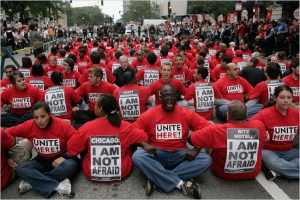
The hospitality workers union Unite Here had its sights set on Donald Trump long before he became president. While Trump was running for the Republican nomination last year, the group waged―and ultimately won—a scrappy battle to form a union of housekeepers and restaurant workers at Trump’s hotel in Las Vegas.
And now with Trump in the White House, the union’s president, D. Taylor, argues that the best place to fight his policies is still in the workplace.
“Most of these jobs are not good jobs,” Taylor said of hotel and food service positions that Trump’s business history typically employed. “The only way those jobs change is if people have good union contracts, decent wages, good healthcare, and retirement benefits. As much as we’d all love for manufacturing jobs to come back, we think we need to turn these [hospitality] jobs into good jobs.”
Unite Here has boosted its membership by 12,000 this year, many of them at hotels and casinos across the South, bringing the union’s ranks close to 300,000 workers. Taylor noted that the past year has seen the union’s fastest growth. This is especially noteworthy considering that Union membership in the private sector has fallen to under 7 percent in the U.S.
In a show of force and solidarity, the union held demonstrations in more than 40 different cities on Oct. 19, supercharging its labor fights with companies like Disney, Marriott, and Google, and simultaneously protesting the Trump administration’s hardline immigration policies. The point, Taylor said, is to demonstrate that “we need advancement in our working standards, and we need protections for the workers who drive this industry.”
For a lot of members, those immigration policies are personal. As a union made up of service workers, Unite Here’s membership is heavily populated with immigrants. In Florida, the union represents 500 Haitian workers at Disney World who are at risk of losing their temporary protected status shielding them from deportation. Trump’s Department of Homeland Security has since moved to end the Haitian TPS program, making it possible for 59,000 people to remain in the U.S. instead of returning to a country crippled by natural disasters.
Although Unite Here and Disney are often at odds with each other, the two have found themselves on the same side regarding preserving the protected status program. Taylor noted that pressure from businesses is often a deciding factor for the White House.
Meanwhile, in New York, food service workers marched from Madison Square Garden to Trump Tower as a way to demand the president preserve TPS and the Deferred Action for Childhood Arrivals program, which gives temporary work permits to undocumented immigrants who arrived in the U.S. as children. Trump announced an end to DACA, which was put in place by President Barack Obama, and Congress is still fumbling to come up with a resolution. Over the past five months, Trump has used DACA recipients (or “Dreamers”) as a bargaining chip in his border security negotiations.
“Our union has a lot of immigrants from all corners of the globe,” said Gerard Cerda, who’s worked as a beer vendor at Madison Square Garden for 24 years. “Many of them are lower-paid employees. We have to support their efforts to better their lives.”
Unite Here has been working on the details of collective bargaining agreements to protect those immigrant laborers, an undertaking that has become more urgent under Trump. The strategy includes convincing employers to prohibit immigration officers on job sites unless they show a warrant. The union is also pushing employers to promise not to do “self-audits” of employees’ immigration paperwork unless required by the government. The union also wants employers to agree to contribute money to assistance funds for undocumented workers who lose their jobs.
Taylor explained that such contract wins are one-way unions can resist Trump’s immigration policies at the bargaining table. “We need to be moving forward, not just playing defense,” Taylor said. “We want to win strong contracts, and we want to win protections for these workers.”





